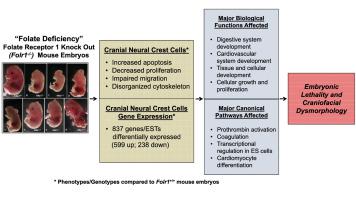Differentiation ( IF 2.9 ) Pub Date : 2020-11-27 , DOI: 10.1016/j.diff.2020.11.001 R S Seelan 1 , P Mukhopadhyay 1 , J Philipose 1 , R M Greene 1 , M M Pisano 1

|
Folic acid is a nutrient essential for embryonic development. Folate deficiency can cause embryonic lethality or neural tube defects and orofacial anomalies. Folate receptor 1 (Folr1) is a folate binding protein that facilitates the cellular uptake of dietary folate. To better understand the biological processes affected by folate deficiency, gene expression profiles of gestational day 9.5 (gd9.5) Folr1−/− embryos were compared to those of gd9.5 Folr1+/+ embryos. The expression of 837 genes/ESTs was found to be differentially altered in Folr1−/− embryos, relative to those observed in wild-type embryos. The 837 differentially expressed genes were subjected to Ingenuity Pathway Analysis. Among the major biological functions affected in Folr1−/− mice were those related to ‘digestive system development/function’, ‘cardiovascular system development/function’, ‘tissue development’, ‘cellular development’, and ‘cell growth and differentiation’, while the major canonical pathways affected were those associated with blood coagulation, embryonic stem cell transcription and cardiomyocyte differentiation (via BMP receptors). Cellular proliferation, apoptosis and migration were all significantly affected in the Folr1−/− embryos. Cranial neural crest cells (NCCs) and neural tube explants, grown under folate-deficient conditions, exhibited marked reduction in directed migration that can be attributed, in part, to an altered cytoskeleton caused by perturbations in F-actin formation and/or assembly. The present study revealed that several developmentally relevant biological processes were compromised in Folr1−/− embryos.
中文翻译:

妊娠期叶酸缺乏改变胚胎基因表达和细胞功能
叶酸是胚胎发育所必需的营养素。叶酸缺乏会导致胚胎致死或神经管缺陷和口面部异常。叶酸受体 1 (Folr1) 是一种叶酸结合蛋白,可促进细胞摄取膳食叶酸。为了更好地了解受叶酸缺乏影响的生物学过程,将妊娠第 9.5 天 (gd9.5) Folr1 -/-胚胎的基因表达谱与 gd9.5 Folr1 +/+胚胎的基因表达谱进行了比较。发现 837 个基因/EST 的表达在Folr1 -/- 中发生了差异性改变胚胎,相对于在野生型胚胎中观察到的那些。对837个差异表达基因进行了Ingenuity Pathway分析。在Folr1 -/-小鼠中受影响的主要生物学功能是与“消化系统发育/功能”、“心血管系统发育/功能”、“组织发育”、“细胞发育”和“细胞生长和分化”相关的功能,而受影响的主要经典途径是与凝血、胚胎干细胞转录和心肌细胞分化(通过 BMP 受体)相关的途径。Folr1 -/-中的细胞增殖、凋亡和迁移均受到显着影响胚胎。在叶酸缺乏条件下生长的颅神经嵴细胞 (NCC) 和神经管外植体表现出定向迁移的显着减少,这部分归因于 F-肌动蛋白形成和/或组装的扰动引起的细胞骨架改变。目前的研究表明,Folr1 -/-胚胎中的几个发育相关的生物过程受到了损害。


























 京公网安备 11010802027423号
京公网安备 11010802027423号